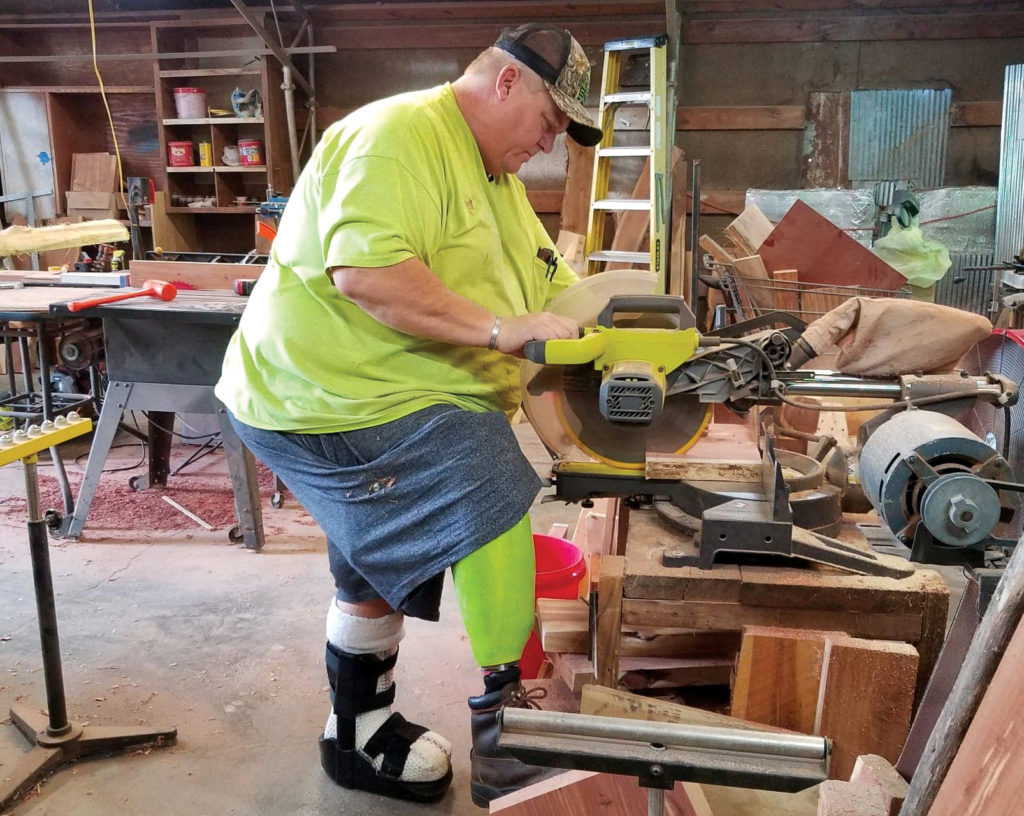By Emily Dings
Whether you’re a recent amputee or have been one all your life, the problem of liner odor, well—it stinks. After the many adjustments and recalibrations you’ve likely endured when acclimating to a prosthetic device, the pungent odor that can accumulate between liner and skin can feel like insult added to injury.
Todd Barrone is a fourth-generation woodworker who has been a below-knee amputee for two years following a battle with osteomyelitis in his right foot. He began to have a problem with sweat and odor while in his woodworking shop, particularly in the warm months.

“It was enough to make me gag,” he remembers.
His prosthetist recommended a product that didn’t work for him, so he experimented on his own, trying his regular aerosol deodorant between his skin and liner. He applies the spray at night, and so far has had great results controlling the odor throughout the day.
Barrone’s experience shows that the problem—and the solution—is different for every amputee. It’s very important to make sure you find something that doesn’t irritate your skin, he says, as this can create more serious problems. He is also vigilant about keeping his leg and liners clean, rotating between two liners and washing the one he’s not using with body soap. Wiping his leg clean with a warm washcloth in the shower has also helped minimize the odor and prevent infection.
On his website, www.amputeewoodworker.com, Barrone discusses his craftsmanship and the issues he faces as a new amputee through blog posts and videos. The first six minutes of his video “Goodbye Summer, Hello Autumn!” (https://bit.ly/38QrRKF) addresses the sweat and odor issue in particular.

Matt Hopkins has been a right below-knee amputee all his life, and he knows the problem well. The traditional prosthetic sock he uses absorbs moisture and odor throughout the day, creating a smell that only his dog could love. He’s experimented with some deodorant products but so far hasn’t found one that has made a real difference.
“It’s worse when I’m out doing something really physical,” Hopkins says, like when he goes for a long hike. “Long pants don’t really mask it—you take a step, and it squirts the stinky air out.” It’s also toughest in the summer, he says. “If you could control the perspiration, that could cut it down a lot.”
Thankfully, researchers such as Chris Born, MD, professor of orthopedic surgery at Brown University, emeritus director of orthopedic trauma at Rhode Island Hospital, and director of the Diane N. Weiss Center for Orthopaedic Trauma Research, have been working hard to reduce stigma about odor and find ways to combat it.

Born notes that while many prosthesis-wearing amputees report struggling with odor, or funk, related to their prosthesis, the problem has received disproportionately little attention in research.
The funk, he explains, results from a complex biological reaction that occurs at the intersection of the skin and the prosthetic liner or sock. Apocrine glands in the skin secrete a combination of fat, proteins, and steroids. In turn, the skin’s sebaceous glands secrete sebum, which traps a mixture of bacteria unique to each person. These bacteria metabolize secretions from the skin glands, creating an odor that often resembles that of vinegar or cheese. It can then be trapped in the crevices of the skin as well as the microfolds of the liners themselves.
“When people remove their prosthesis and liner, 60 to 70 percent…have an odor that can be socially embarrassing,” he says.
The first line of defense against the smell, as Hopkins and Barrone affirm, is good hygiene. Born notes that “fewer than 50 percent of amputees follow a daily or twice-daily routine for residual limb skin and liner hygiene.” He recommends that liners be changed twice a day and washed with soap and water or alcohol. It’s also important to recognize that hygiene needs vary depending on whether the amputation was traumatic or due to a medical/vascular condition, as well as the age of the amputee.
But while rotating liners and keeping skin clean are imperative for overall limb health, these practices are generally not enough to prevent the pungent smell that plagues so many amputees. As Born observes, “prosthetic wearers who adhere to a good hygiene regimen can still have a problem with odor,” and may accumulate a medicine cabinet full of products that promise solutions.
Antiperspirants, isopropyl alcohol, chlorhexidine, talcum powder, and Febreze are all in frequent rotation among odor-battling amputees. Alum is an effective antiperspirant that some find helpful, but because it works by blocking pores, it may also keep smelly bacteria in place.
Born notes that many products have been developed to improve comfort and reduce irritation among prosthesis wearers. But far fewer have been formulated to address the odor problem even though it can significantly affect an amputee’s day-to-day life. The powerful combination of moisture, glandular secretions, and bacteria can develop quickly, especially in warm weather. For athletes, the problem is even more intense.
Enter Born and his research team at Brown. They have been evaluating a proprietary formulation of titanium silver carboxylate that is used to coat liners, reducing odor and irritation.
The coating remains chemically bonded to the liner, releasing antimicrobial silver ions over a period of two to three weeks rather than all at once. Because of this gradual release and because the coating doesn’t wash off with soap or alcohol, there’s no need for constant reapplication.
Born and his team spent a decade evaluating the quick-drying coating, which they named Apocrine. Adding a sponge applicator wand that allows users to paint the coating onto their liner, they began marketing it to prosthetists. While patients gave samples of the product favorable reviews, Born notes that it was difficult to secure the insurance code that would make it reimbursable through Medicare/Medicaid. To avoid delaying the commercial availability of the product any longer, selling it direct to consumers became the best option. The product was released in March by the company BI Medical as The Liner Wand w/Apocrine.
So far, testimonials from users of The Liner Wand have been excellent and have even revealed unanticipated benefits, Born says. One testimonial from an amputee body builder notes that the product helped keep the liner in place and comfortable during his workouts.
Because so many variables—nature of amputation, individual microbiome, and activity level, to name a few—influence each person’s odor development, there may be no one-size-fits-all solution to the problem. But with a variety of odor-fighting products now available, the hope is that amputees like Hopkins and Barrone will be able to get back to their favorite activities unencumbered by self-consciousness.
Assisting in this effort, Born notes, are organizations like the Amputee Coalition that “bring the problem out of the closet” and allow amputees to talk to others who are experiencing it through online forums. “There is a brotherhood and sisterhood in the amputee community,” he says. “People talk to each other and bounce ideas off each other. You realize you’re not the only one.”
The more information shared about effective products and hygiene habits, the more people will find the specific solution that works for them as well. The example of The Liner Wand shows that years of research and development may precede a product’s commercial availability. So, if you haven’t yet found something that works for you, stay optimistic and informed. A rosy-smelling future may be just around the corner.
ODOR-FIGHTING PRODUCTS
Metro Liners Sanitizing Spray by College Park



